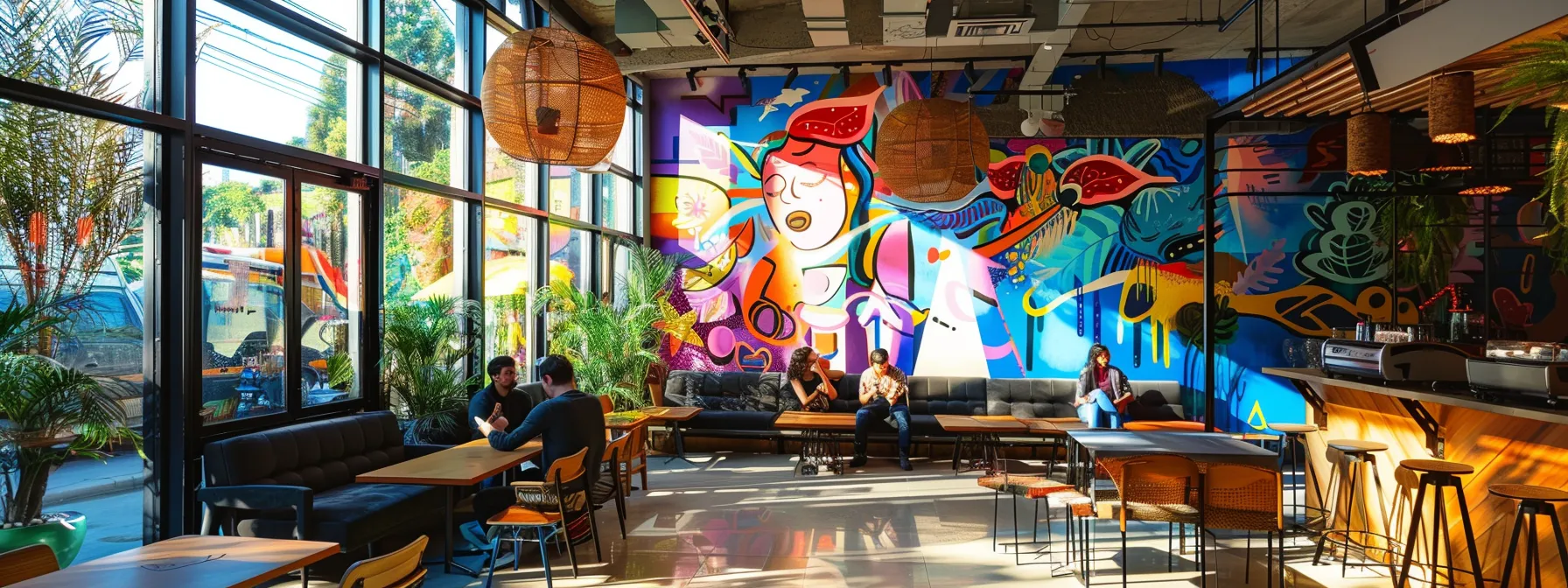Are you struggling to attract more guests to your hostel through online channels?
Search engine optimisation (SEO) can help boost your visibility and attract more bookings. This guide will cover essential SEO techniques tailored for hostels, including keyword research, on-page optimisation, and local SEO strategies.
By implementing these proven methods, you’ll improve your hostel’s search engine rankings, increase website traffic, and ultimately, welcome more travellers to your doorstep.

Key takeaways
- Optimising Google My Business listings is crucial for improving local visibility and attracting nearby travellers.
- Incorporating local keywords into website content enhances a hostel’s presence in local search results.
- Collecting and responding to reviews on search platforms boosts credibility and attracts more potential guests.
- Using analytics tools to track website traffic helps hostels refine their SEO strategies effectively
- Setting specific, achievable SEO goals allows hostels to measure progress and continuously improve their online presence.
Understand the basics of SEO for hostels
Understanding SEO basics is crucial for hostel owners aiming to boost their online presence. This section explores what SEO means for hostels, its role in increasing visibility, and essential terminology.
From defining target audiences to creating effective backlinks, these insights form the foundation of a solid digital marketing strategy, helping attract digital nomads and other travellers through improved search rankings.
What SEO means for your hostel
SEO for hostels means optimising their online presence to attract more guests through search engines. By focusing on local search strategies, hostel owners can boost their visibility to travellers looking for dormitory-style accommodation in specific areas. This approach helps hostels compete effectively in the digital landscape.
Effective SEO involves building a strong brand presence online. Hostels can achieve this by creating engaging content that resonates with their target audience, such as digital nomads and backpackers. Research into guest preferences and travel trends can inform content creation and website optimisation strategies.
Analytics play a crucial role in hostel SEO. By tracking website performance and visitor behaviour, hostel owners can refine their SEO tactics. This data-driven approach allows for continuous improvement, ensuring the hostel’s online presence aligns with guest search patterns and preferences.
The role of SEO in increasing visibility
SEO plays a vital role in boosting a hostel’s visibility in organic search results. By optimising web pages and landing pages, hostels can increase their chances of appearing higher in search engine rankings when potential guests look for accommodation.
This improved visibility helps hostels compete effectively with larger hospitality brands and travel agencies.
Effective SEO strategies help hostels target specific audiences, such as backpackers or digital nomads. By tailoring content to these groups and optimising for relevant keywords, hostels can attract more qualified traffic to their websites. This targeted approach often leads to higher conversion rates and improved booking numbers.
SEO also enhances a hostel’s online reputation and credibility. When a hostel consistently appears in top search results, it builds trust with potential guests. This increased visibility can lead to more reviews, mentions on travel blogs, and social media shares, further boosting the hostel’s online presence and attracting more guests.
Essential SEO terminology for hostel owners
Hostel owners should familiarise themselves with key SEO terms to improve their online presence. ‘User experience’ and ‘usability’ are crucial factors that search engines consider when ranking websites. By enhancing these aspects, hostels can attract more digital nomads and improve their search rankings.
“Content marketing” is another essential concept for hostel owners. This strategy involves creating valuable, relevant content that appeals to potential guests, including long-form articles about local attractions or tips for budget travel.
Such content can help hostels target ‘long tail’ keywords, which are specific phrases that travellers might use when searching for accommodation.
Understanding the importance of “backlinks” and “domain authority” can significantly boost a hostel’s SEO efforts. Hostels can improve their search rankings by obtaining quality backlinks from reputable travel websites and increasing their domain authority. This approach helps attract more nomads and travellers searching for unique accommodation experiences:
With the basics of SEO under your belt, it’s time to sharpen your focus. Let’s turn our attention to the people who matter most: your potential guests and their online habits.
Identify your target audience and their online behaviour

Identifying the target audience and understanding their online behaviour is crucial for hostel SEO success. This section examines travellers’ search habits, online booking patterns, and tailored SEO strategies. By analysing these factors, hostels can improve their visibility in the hospitality industry, reduce bounce rates, and craft compelling descriptions that attract ideal guests.
Analyse travellers’ search habits
Travellers often use mobile devices to search for accommodation, making mobile-friendly websites crucial for hostels.
They frequently use specific keywords related to location, price, and amenities when looking for places to stay. Understanding these search patterns helps hostels optimise their content for relevant keywords and improve their visibility in search results.
Voice search is becoming increasingly popular in the tourism industry, with travellers using voice-activated assistants to find hostels and local attractions. Hostels can adapt their SEO strategies by incorporating natural language phrases and question-based keywords that match how people speak when using voice search.
Analysing search trends reveals that travellers often look for experiences alongside accommodation. Hostels can capitalise on this by creating content that highlights local events, attractions, and activities. This approach not only improves SEO but also positions the hostel as a valuable resource for tourists seeking a complete travel experience.
Understand how guests book Hostels online
Guests often book hostels through online travel agencies (OTAs) and metasearch engines, which emphasise the importance of link building for hostels. By improving their web design and optimising for these platforms, hostels can increase their visibility and revenue. However, it’s crucial to avoid keyword stuffing, as this can negatively impact search rankings.
Direct bookings through a hostel’s website are becoming more common, especially among budget-conscious travellers.
To capitalise on this trend, hostels should focus on creating user-friendly booking systems and compelling content that aligns with search engine algorithms. This approach can help reduce reliance on third-party booking sites and increase direct revenue.
Mobile bookings are on the rise, with many guests using smartphones to research and book hostels. Hostels should ensure their websites are mobile-responsive and offer a seamless booking experience across all devices.
This strategy can lead to improved search rankings and increased bookings, as search engines favour mobile-friendly sites in their algorithms.
Tailor SEO strategies to attract your ideal guests
Hostels can tailor their SEO strategies to attract ideal guests by focusing on key factors such as property type, local culture, and price range.
By optimising content around these elements, hostels can improve their visibility to travellers seeking specific experiences. This approach helps hostels stand out in online searches and attract guests who value their unique offerings.
Effective online advertising plays a crucial role in attracting ideal guests. Hostels can use targeted ads and social media campaigns to reach their desired audience. By highlighting amenities like free internet access, hostels can appeal to digital nomads and budget-conscious travellers who prioritise connectivity during their stays.
Understanding the preferences of ideal guests allows hostels to create tailored content that resonates with their target audience.
This can include blog posts about local attractions, guides to budget travel, or information about cultural experiences near the property. By providing valuable content, hostels can improve their search rankings and attract guests who align with their brand:
- Identify key guest preferences (e.g., culture, price, amenities)
- Optimise website content for relevant keywords
- Create targeted online advertising campaigns
- Develop engaging content that appeals to ideal guests
- Highlight unique property features and local experiences
The hostel’s target audience was clear. Now it was time to dig deeper into their online habits.
Perform keyword research specific to Hostels

Keyword research is vital for hostels to improve their Google search results and attract more guests. This section explores finding high-impact keywords, using research tools effectively, and incorporating long-tail keywords to reach niche markets.
By optimising their Google Business Profile and using proper anchor text, hostels can boost their online visibility and attract more bookings.
Find high-impact keywords relevant to Hostels
Hostels can find high-impact keywords by focusing on relevance and user intent. They should consider phrases that potential guests might use when searching for budget-friendly accommodation. These keywords often include location-specific terms, amenities, and price ranges.
Social media platforms offer valuable insights into trending topics and popular phrases among travellers. Hostels can monitor these channels to identify keywords that resonate with their target audience. This approach helps them stay current with traveller preferences and adapt their keyword strategy accordingly.
Effective revenue management involves understanding the seasonality of hostel bookings and adjusting keywords to match. Hostels can optimise their online presence by incorporating phrases related to peak travel periods, local events, or off-season deals. This strategy helps attract guests throughout the year:
- Analyse competitor keywords
- Use location-specific terms
- Include amenities and unique features
- Consider seasonal variations
- Incorporate budget-friendly phrases
Use keyword research tools effectively
Hostel owners can use keyword research tools to identify popular search terms among travellers. These tools help uncover valuable keywords related to guest houses and budget accommodation, allowing hostels to tailor their content management systems for better visibility.
By focusing on relevant terms, hostels can attract more attention from potential customers searching for affordable lodging options.
Social media marketing plays a crucial role in keyword research for hostels. By analysing social media trends and conversations, hostel owners can discover the language their target audience uses when discussing travel plans. This insight helps create content that resonates with potential guests and improves the hostel’s search engine rankings.
Effective use of keyword research tools involves analysing search volumes and competition levels for relevant terms. Hostel owners should prioritise keywords with a good balance of search volume and competition, ensuring their content targets phrases that potential customers are likely to use.
This approach helps hostels attract more qualified traffic and improve their online presence.
Include long-tail keywords to reach niche markets
Hostels can reach niche markets by incorporating long-tail keywords related to specific traveller interests. For example, targeting phrases like “sustainable hostel with desk space” can attract eco-conscious digital nomads seeking workspaces. This approach helps hostels stand out in search results and appeal to travellers with particular preferences.
Using long-tail keywords associated with travel guides can boost a hostel’s visibility. Phrases such as “hostels recommended by Lonely Planet” can attract travellers who rely on trusted guidebooks. Additionally, including terms related to language preferences, like “English-speaking staff”, can help hostels appeal to international guests seeking comfortable communication during their stay.
Email marketing campaigns can benefit from long-tail keyword research. Hostels can use specific phrases in their subject lines and content to improve open rates and engagement. For instance, “budget-friendly hostel near sustainability projects” could attract environmentally conscious travellers, helping hostels reach niche markets effectively.
Armed with the right keywords, you’re ready to make your website shine. Now, let’s sharpen your on-page elements to catch Google’s eye.
Optimise your Website’s on-page elements

Optimising on-page elements is crucial for enhancing a hostel’s online presence. This section covers crafting compelling meta titles and descriptions, improving site structure, enhancing content with keywords, and optimising images.
These techniques boost a hostel’s credibility, aid understanding, and improve search engine rankings. Effective copywriting and reputation management are key to attracting more guests through email and online bookings.
Craft compelling meta titles and descriptions
Crafting compelling meta titles and descriptions is crucial for hostel owners to attract their target market. These elements serve as the first impression for potential guests in search results. By incorporating relevant keywords and highlighting unique selling points, hostels can increase click-through rates and improve their search engine rankings.
Effective meta descriptions should reflect the hostel’s ownership and expert status in providing accommodation. They should concisely convey the hostel’s unique features, location, and value proposition. By using persuasive language and addressing travellers’ needs, hostels can entice users to click through to their website.
Content management plays a vital role in creating impactful meta elements. Hostel owners should regularly update their meta titles and descriptions to reflect current offerings, pricing, and promotions. This approach ensures that the information displayed in search results remains relevant and appealing to potential guests:
Improving site structure enhances navigation for hostel websites, making it easier for guests to find information on desktop computers and mobile devices.
A well-organised menu structure with clear categories helps visitors quickly locate essential details about rooms, amenities, and local attractions. This improved user experience can lead to higher engagement and better search engine rankings.
Content creation plays a crucial role in site structure optimisation. Hostels can develop a blog post section that offers travel tips and local insights, enhancing the website’s overall value. By organising content into logical categories and using internal linking, hostels can guide visitors through their site effectively, encouraging longer visits and reducing bounce rates.
Implementing a property management system can streamline the booking process and improve site structure. By integrating this system with the website’s navigation, hostels can create a seamless experience for guests, from browsing rooms to completing reservations.
This integration not only enhances user experience but also contributes to better search engine optimisation by reducing page load times and improving site functionality.
Enhance content with relevant keywords
Hostels can enhance their content with relevant keywords by incorporating them into blog posts and social media channels. By creating informative articles about local attractions, budget travel tips, and hostel experiences, they can naturally include keywords that potential guests might use in their searches. This approach improves search engine visibility and provides valuable information to travellers.
Effective marketing strategies for hostels often involve using Facebook ads and Google Hotel Ads to reach potential guests. These platforms allow hostels to target specific demographics and interests, using relevant keywords in ad copy to attract attention. By aligning ad content with website keywords, hostels can create a consistent message across all marketing channels.
Hostels can improve their SEO by regularly updating their website content with fresh, keyword-rich information. This might include creating new pages for seasonal events, updating room descriptions with relevant terms, or adding guest testimonials that naturally incorporate important keywords. Consistent content updates signal to search engines that the website is active and relevant, potentially improving search rankings.
Optimise images for faster loading times
Optimising images for faster loading times is crucial for hostels targeting travelers in popular destinations like New York City. By compressing images and using appropriate file formats, hostels can improve their website speed, enhancing the user experience for potential guests searching for accommodation online.
Effective online marketing for hostels includes showcasing high-quality images of rooms and facilities. However, these images must be optimised to prevent slow loading times, which can deter potential guests. Hostels can use image compression tools to reduce file sizes without compromising visual quality, ensuring their websites remain attractive and functional.
Influencer marketing often involves sharing visually appealing content, and hostels can leverage this by providing optimised images for influencers to use.
This approach not only improves the hostel’s online presence but also ensures that shared content loads quickly across various platforms. Hostels should consider implementing lazy loading techniques for images, particularly on pages showcasing amenities or baggage storage options:
On-page optimisation sets the stage. Now, let’s dive into the heart of SEO: content that captivates and converts.
Create engaging and valuable content

Creating engaging content is key to boosting a hostel’s online presence and brand awareness. This section explores starting a blog about local attractions, sharing guest stories, and keeping content fresh. By focusing on these areas, hostels can showcase their knowledge, highlight amenities, and attract more travellers through improved search rankings.
Start a blog highlighting local attractions
Hostels can boost their online presence by starting a blog that highlights local attractions. This approach showcases the hostel’s knowledge of the area and provides valuable information to potential guests. By creating content about nearby sights, restaurants, and events, hostels can attract travellers seeking authentic local experiences.
Effective blog content should include a mix of popular tourist spots and hidden gems. Hostels can share insider tips, seasonal events, and budget-friendly activities to appeal to their target audience. This strategy not only improves search engine rankings but also positions the hostel as a helpful resource for travellers.
Incorporating user-generated content, such as guest photos and reviews of local attractions, can enhance the blog’s authenticity and engagement.
Hostels can encourage guests to share their experiences and feature them in blog posts, creating a sense of community and providing diverse perspectives on local attractions:
Hostels can enhance their online presence by sharing guest stories and testimonials on their websites and social media channels. These authentic experiences provide valuable insights for potential guests and improve the hostel’s credibility. By featuring diverse stories from travellers, hostels can showcase their appeal to various demographics and highlight unique aspects of their accommodation.
Incorporating guest testimonials into blog posts and landing pages can significantly boost a hostel’s SEO efforts. These personal accounts often include natural keywords and phrases that potential guests might use when searching for accommodation.
Hostels can encourage guests to mention specific amenities or local attractions in their testimonials, further enhancing the content’s relevance to search queries.
Video testimonials can be particularly effective in engaging potential guests and improving a hostel’s online visibility. Short clips of guests sharing their experiences can be featured on the hostel’s website and social media platforms.
These videos not only provide authentic content but also contribute to increased time spent on the hostel’s web pages, a factor that search engines consider when ranking sites.
Keep content fresh with regular updates
Hostels can keep their content fresh by regularly updating their website with new information about local events and seasonal activities. This approach helps maintain relevance for search engines and provides valuable information to potential guests. By highlighting upcoming festivals, concerts, or seasonal attractions, hostels can attract travellers planning their trips around specific events.
Creating a content calendar can help hostels maintain a consistent flow of fresh updates. This strategy ensures regular posts about room availability, special offers, and new amenities. Hostels can also use this calendar to plan content around peak travel seasons, aligning their updates with travellers’ search patterns and booking habits.
Incorporating user-generated content into regular updates can significantly enhance a hostel’s online presence. Encouraging guests to share their experiences through reviews, photos, or social media posts provides a steady stream of fresh, authentic content. Hostels can feature this content on their website and social media channels, boosting engagement and credibility:
Content alone won’t guarantee success. Quality backlinks are the next step in building your online authority and credibility.
Build quality backlinks to increase credibility

Building quality backlinks is crucial for enhancing a hostel’s online credibility. This section explores collaborating with travel bloggers, getting listed on travel directories, and encouraging guest reviews. These strategies help hostels improve their search rankings, attract more visitors, and build trust with potential guests.
Collaborate with travel bloggers and influencers
Hostels can boost their online presence by collaborating with travel bloggers and influencers. These partnerships often result in high-quality backlinks from reputable travel websites, improving the hostel’s search engine rankings. By offering complimentary stays or unique experiences, hostels can encourage bloggers to create authentic content that showcases their accommodation and local attractions.
Engaging with influencers on social media platforms can significantly expand a hostel’s reach. Instagram, in particular, is a powerful tool for showcasing a hostel’s aesthetic and atmosphere.
Hostels can invite influencers to participate in photo shoots or create Instagram-worthy spots within their property, generating visually appealing content that attracts potential guests.
Collaborating with niche travel bloggers who focus on specific types of travel, such as solo backpacking or eco-tourism, can help hostels target their ideal guests more effectively. These partnerships often lead to more relevant backlinks and content that resonates with the hostel’s target audience.
Hostels can work with bloggers to create tailored content that highlights their unique selling points and appeals to specific traveller demographics:
Get listed on travel directories and booking sites
Hostels can significantly boost their online visibility by listing on popular travel directories and booking sites. These platforms often have high domain authority, providing valuable backlinks that improve a hostel’s search engine rankings.
By ensuring their listings are complete and up-to-date, hostels can attract more potential guests and increase their credibility in the competitive travel market.
To maximise the benefits of directory listings, hostels should focus on creating unique descriptions for each platform. This approach not only avoids duplicate content issues but also allows hostels to tailor their message to different audience segments. By highlighting specific amenities, local attractions, or special offers on various sites, hostels can appeal to a broader range of travellers and improve their chances of securing bookings.
Regularly monitoring and responding to reviews on these platforms is crucial for maintaining a positive online reputation. Hostels should actively engage with guest feedback, addressing concerns and highlighting positive experiences.
This engagement not only improves the hostel’s standing on booking sites but also signals to search engines that the business is active and responsive, potentially boosting its overall search rankings.
Encourage guests to leave reviews on trusted platforms
Hostels can significantly boost their online credibility by encouraging guests to leave reviews on trusted platforms like TripAdvisor and Google. These reviews act as valuable backlinks and social proof, enhancing the hostel’s visibility in search results. By implementing a simple follow-up email system, hostels can prompt guests to share their experiences, increasing the number of authentic reviews.
To motivate guests to leave reviews, hostels can offer incentives such as discounts on future stays or entry into prize draws. However, it’s crucial to ensure these incentives comply with review platform guidelines to maintain credibility.
Hostels can also make the review process easier by providing direct links to their profile pages on various review sites, reducing friction for guests wanting to share feedback.
Responding to reviews, both positive and negative, demonstrates the hostel’s commitment to guest satisfaction and can encourage more travellers to leave feedback. This engagement not only improves the hostel’s reputation but also creates additional content that search engines value, potentially boosting search rankings.
Hostels should aim to respond promptly and professionally, addressing any concerns raised and thanking guests for their input:
The hostel’s online reputation grew stronger with each quality backlink. Now it was time to focus on attracting nearby travellers through local SEO strategies.
Use local SEO to reach nearby travellers

Local SEO is crucial for hostels to attract nearby travellers. This section explores optimising Google My Business listings, incorporating local keywords into content, and collecting reviews on local search platforms. By implementing these strategies, hostels can improve their visibility in local search results and attract more guests to their doorstep.
Optimise your Google My Business listing
Hostels can significantly boost their local visibility by optimising their Google My Business (GMB) listing. This free tool allows hostel owners to manage their online presence across Google’s services, including Search and Maps. By providing accurate and detailed information, hostels can improve their chances of appearing in local search results and attracting nearby travellers.
To optimise a GMB listing, hostels should ensure all information is up-to-date and comprehensive. This includes accurate business hours, contact details, and a detailed description of the hostel’s amenities and unique features.
Adding high-quality photos of the hostel’s exterior, common areas, and rooms can help attract potential guests and give them a better idea of what to expect.
Regularly posting updates and offers on the GMB profile can keep the listing fresh and engaging. Hostels can share information about local events, special promotions, or new amenities to attract travellers’ attention.
Encouraging guests to leave reviews on the GMB listing can also improve the hostel’s visibility and credibility in local search results.
Incorporate local keywords into your content
Hostels can enhance their local SEO by incorporating area-specific keywords into their website content. This involves using terms that travellers might search for when looking for accommodation in the hostel’s location. For example, a hostel in London might include phrases like “budget-friendly accommodation in Central London” or “backpacker’s hostel near Piccadilly Circus” throughout their site.
Creating location-based content can significantly boost a hostel’s visibility in local search results. Hostels can develop blog posts or landing pages focused on nearby attractions, events, or travel tips.
This approach not only incorporates local keywords naturally but also provides valuable information to potential guests, positioning the hostel as a knowledgeable local resource.
Optimising meta titles and descriptions with local keywords can improve click-through rates from search engine results pages. Hostels should ensure these elements include their location and unique selling points. For instance, a meta title might read “Eco-Friendly Hostel in Brighton | 5 Minutes from the Beach” to attract environmentally conscious travellers looking for seaside accommodation.
Collect reviews on local search platforms
Hostels can boost their local SEO by collecting reviews on popular search platforms like Google, TripAdvisor, and Yelp. These reviews not only improve the hostel’s visibility in local search results but also provide valuable social proof for potential guests.
By encouraging satisfied visitors to share their experiences, hostels can build a strong online reputation that attracts more travellers.
To gather more reviews, hostels can implement a follow-up system that prompts guests to leave feedback shortly after their stay. This can be done through automated emails or text messages that include direct links to review platforms. Hostel staff can also personally ask guests to share their thoughts online, emphasising the importance of honest feedback for improving services.
Responding to reviews, both positive and negative, is crucial for maintaining a strong local search presence. Hostels should address concerns raised in negative reviews promptly and professionally, showing potential guests that they value customer feedback.
Thanking reviewers for positive comments and highlighting specific aspects of their stay can encourage more guests to leave detailed, keyword-rich reviews that benefit the hostel’s local SEO efforts.
Local SEO draws in nearby travellers. But how do you know it’s working?
Monitor and analyse your SEO performance

Monitoring and analysing SEO performance is crucial for hostels to improve their online visibility. This section explores using analytics tools to track website traffic, adjusting strategies based on data insights, and setting achievable goals for ongoing improvement.
By focusing on these areas, hostels can refine their SEO efforts and attract more guests through better search rankings.
Use analytics tools to track website traffic
Hostels can effectively track their website traffic using analytics tools like Google Analytics. These tools provide valuable insights into visitor behaviour, helping hostel owners understand which pages are most popular and where guests are coming from.
By regularly monitoring these metrics, hostels can identify trends and adjust their SEO strategies accordingly.
Setting up conversion tracking is crucial for measuring the success of a hostel’s online booking system. Analytics tools allow owners to track how many visitors complete a booking, which pages they visit before booking, and where they might be dropping off in the process.
This information helps hostels optimise their website to increase bookings and improve the overall user experience.
Mobile traffic analysis is particularly important for hostels, as many travellers use smartphones to research and book accommodation. Analytics tools can show the percentage of mobile visitors and how they interact with the site differently from desktop users.
This data helps hostels ensure their website is fully optimised for mobile devices, potentially boosting their search rankings and improving the booking experience for on-the-go travellers.
Adjust your strategies based on data insights
Hostels can refine their SEO strategies by analysing data insights from their website performance. By examining metrics such as page views, bounce rates, and conversion rates, hostel owners can identify which aspects of their online presence are working well and which need improvement.
This data-driven approach allows for targeted adjustments that can significantly boost a hostel’s visibility in search results.
Keyword performance analysis is crucial for optimising a hostel’s content strategy. By reviewing which keywords drive the most traffic and lead to bookings, hostels can focus their efforts on creating content that resonates with their target audience. This approach helps hostels attract more qualified leads and improve their overall search engine rankings.
User behaviour data can inform website design and content placement decisions. By analysing how visitors navigate the site, hostels can streamline the booking process and highlight popular amenities or local attractions. This user-centric approach often leads to improved engagement and higher conversion rates. Hostels should regularly review and adjust their strategies based on these insights:
- Analyse website metrics (page views, bounce rates, conversions)
- Review keyword performance and adjust content strategy
- Optimise website design based on user behaviour data
- Continuously monitor and refine SEO tactics
Set achievable goals for ongoing improvement
Hostels can set achievable SEO goals by focusing on specific metrics that directly impact their online visibility. For example, they might aim to increase organic search traffic by 15% over three months or improve their average search position for key terms by five spots.
These targeted objectives provide clear benchmarks for measuring progress and motivating ongoing improvement efforts.
Breaking down larger SEO goals into smaller, manageable tasks helps hostels maintain momentum in their optimisation efforts. They might set weekly targets for creating new content, updating meta descriptions, or building quality backlinks. This approach allows hostel owners to track progress consistently and make timely adjustments to their strategies based on real-time performance data.
Regular review and adjustment of SEO goals ensure that hostels stay aligned with changing market trends and guest preferences. By analysing the success of previous objectives and considering factors like seasonal fluctuations in travel demand, hostels can set realistic targets that drive continuous improvement in their online presence.
This adaptive approach helps hostels remain competitive in search results and attract more potential guests over time.
Frequently asked questions
How can I identify the right keywords for my hostel’s SEO strategy?
To identify the right keywords for your hostel’s SEO strategy, start by brainstorming terms related to your location, amenities, and target audience.
Use keyword research tools to analyse search volume and competition for these terms, focusing on long-tail keywords that are specific to your hostel’s unique offerings. Consider the search intent behind potential keywords, ensuring they align with your hostel’s goals.
Examine your competitors’ keywords and look for gaps in their strategies. Prioritise keywords that balance relevance, search volume, and competition level to create a well-rounded SEO strategy for your hostel.
What are the essential on-page elements to optimise for a hostel website?
Essential on-page elements for a hostel website include optimising title tags, meta descriptions, and headers with relevant keywords.
Focus on creating unique, informative content for each room type and amenity. Ensure fast loading times, mobile responsiveness, and easy navigation to improve user experience and search engine rankings. Implement structured data markup for local businesses and accommodate schema for room types and pricing.
Use high-quality images with descriptive alt text, and include location-specific content to attract travellers. Create an XML sitemap, optimise internal linking, and ensure all pages have user-friendly URLs for better crawlability and indexing.
How can local SEO help my hostel reach more potential guests?
Local SEO can significantly boost your hostel’s visibility to potential guests searching for accommodation in your area. By optimising your website and online listings with location-specific keywords, creating localised content, and managing your Google Business Profile, you can improve your rankings in local search results.
Encouraging guests to leave reviews, optimising for mobile devices, and building local backlinks can further enhance your hostel’s online presence. These strategies help you appear in map listings and local search queries, making it easier for travellers to find and choose your hostel when planning their stay.
What types of content should I create to engage travellers and improve SEO?
To engage travellers and improve SEO, create destination guides that highlight unique attractions, local experiences, and insider tips. Develop detailed itineraries for different trip durations and travel styles, incorporating popular landmarks and hidden gems to cater to various interests.
Produce visually appealing content such as high-quality photos, virtual tours, and interactive maps to showcase destinations. Share authentic travel stories, practical tips on accommodation, transportation, and local customs, and create informative blog posts addressing common travel queries and concerns.
How should I monitor and analyse my hostel’s SEO performance?
Monitoring your hostel’s SEO performance should be an ongoing process, with weekly checks of key metrics such as organic traffic, keyword rankings, and conversion rates. This regular review allows you to spot trends, identify issues quickly, and make timely adjustments to your SEO strategy.
For a more in-depth analysis, conduct monthly or quarterly audits of your hostel’s website performance, backlink profile, and content effectiveness. These comprehensive evaluations help you assess the overall impact of your SEO efforts, plan future optimisations, and stay ahead of competitors in search engine results.
Conclusion
Enhancing a hostel’s online presence through proven SEO techniques is crucial for attracting more guests and staying competitive in the digital landscape.
By implementing strategies such as keyword optimisation, creating engaging content, and building quality backlinks, hostels can significantly improve their visibility in search engine results and appeal to their target audience.
Local SEO efforts, including optimising Google My Business listings and incorporating location-specific keywords, are particularly effective in reaching nearby travellers and boosting bookings. Regularly monitoring and analysing SEO performance allows hostels to refine their strategies, set achievable goals, and continuously improve their online presence, ultimately leading to increased occupancy rates and revenue.




